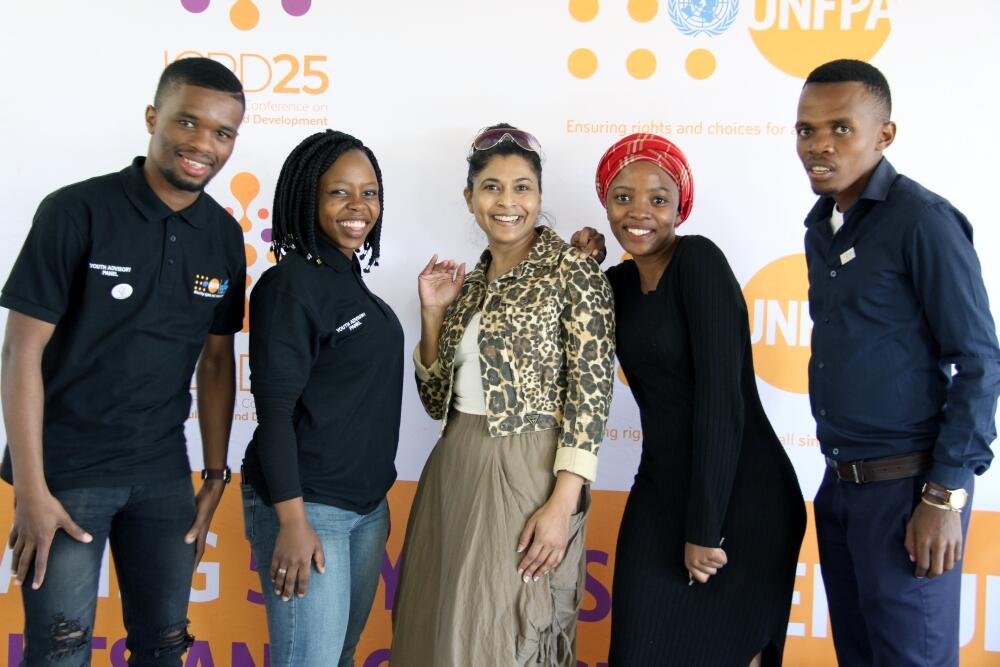UTHUKELA DISTRICT, South Africa—Young people face many obstacles to their sexual and reproductive health and rights, and they must work with government and partners to rectify this.
“We know you have many challenges [such as] high teenage pregnancy and HIV rates in the area, and many young mothers feeling helpless after giving birth due to inadequate SRH service provision, but you can’t give up. You need to help us help you get things right!” said local ward Councillior Ernest Ndumo.
He urged young people to stay in school and focus on the future.
Mr. Ndumo was speaking at aconversation on the sexual and reproductive health challenges faced by young people, which was hosted by a dynamic group of UNFPA Youth Advisory Panel (YAP) members. The event was organized to celebrate 25 years of the International Conference on Population and Development (ICPD25), a ground-breaking event held in Cairo, Egypt in 1994.
The conversation was hosted at Bhekuzulu Self-Sufficient Project Hall in uThukela District, a rural area that has distinct needs when it comes to reproductive health services. Provincial government officers and the local leadership of the ward took part, along with about 150 young people.
ICPD a turning point for women and the world

services and information that enable the realization of the sexual and
reproductive health and rights, this has been uneven and inequalities
persist, said UNFPA Representative Beatrice Mutali.
© UNFPA South Africa/Ziyanda Ngoma
UNFPA Representative Beatrice Mutali traced the advances made in reproductive health since the ICPD in Cairo 25 years ago. The ICPD was a turning point for women and the world in that governments recognized that women and girls’ need for reproductive health care, education and advancement are the key to sustainable development.
Referring to UNFPA’s recently launched flagship report, State of World Population 2019, Ms. Mutali said that significant progress has been made by countries in extending access to services and information that enable the realization of the full range of sexual and reproductive health and rights. However, progress has been uneven and inequalities persist, she said.
Reverend Mbalo, director of the provincial population unit, encouraged young people to use contraceptives including condoms when engaging in sexual relations, as this is one of the most effective dual contraception methods that will ensure they are protected against pregnancy and HIV.
Unpacking gaps in access to services

© UNFPA South Africa/Ziyanda Ngoma
A lively panel discussion touched on major gaps in access to sexual and reproductive health services by marginalized groups, including people with disabilities, LGBTIQ (lesbian, gay, bisexual, transgender, intersex and queer), rural and urban poor and young people in South Africa.
The panel discussion was facilitated by Nonkuuleko Zondo, a Youth Advisory Panel (YAP) member, and the panel consisted of YAP member Zama Mthembu, Okuhle Youth Organization’s Nqobile Khumalo, Deputy Chairperson of uThukela District AIDS Council Sakhile Xaba, loveLife’s Masiphile Hadebe, a grade 9 leaner from Bonokuhle High School and Thulisile Buthelezi from community organization Source of Hope Youth Foundation.
In tracking progress since the ICPD in 1994, it was highlighted that the commitments made in Cairo at the conference were still relevant and important, particularly as young women and girls were faced with stigmatization when visiting public facilities to access SRHR services. Girls in particular fear obtaining contraceptives in clinics because they are often mistreated and judged by service providers for engaging in sexual relations. Youth-friendly clinics need to become a reality in the public sector and there is a need to capacitate health-care workers with knowledge to ensure that they create an enabling and a safe space for young women and girls.
Teen mums are left behind
Teenage mothers are still being left behind, and the stigma attached to teenage pregnancy negatively influences support to young teenage mothers. Most interventions are aimed at preventing pregnancy – there are few that provide support for those who are pregnant. This leaves them vulnerable and likely to get pregnant again.
Parents and the broader community were distancing themselves from issues related to SRHR, a parent and member of the community said. There is a need to bridge the generational gap in SRHR.
Child marriage persists in rural areas and is a key driver of gender-based violence and teenage pregnancy. Girls are being deprived of the right to decide for themselves when it comes to their bodies. There is a tendency for parents to hand over their young girls for marriage for economic benefits, without considering that this is a violation of the child’s rights, which subsequently limits her access to education and SRHR.
The continuous exclusion of the LGBTIQ community remains a major challenge, as does lack of information and incompetent provision of family planning facilities. Stigma and discrimination among society in general as well as service providers need to be dismantled. LGBTIQ communities are being mistreated, harassed and denied services outright in health-care facilities, which infringes their right to access sexual and reproductive health. Service providers are often uninformed on issues related to LGBTIQ.
- Ziyanda Ngoma


